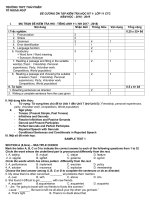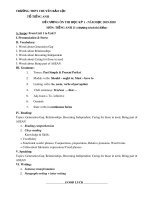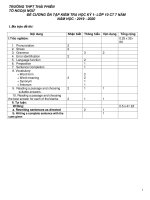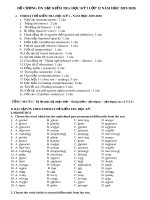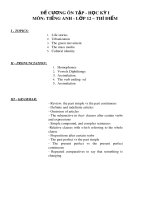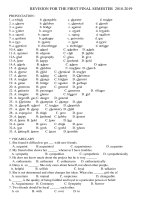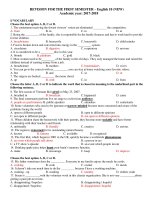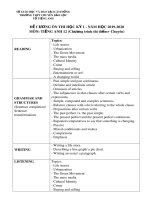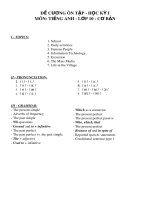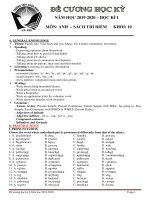Đề cương ôn tập học kì 1 môn Tiếng Anh 8 năm 2019-2020 - Trường THCS Thị trấn Mỏ Cày Bắc
Bạn đang xem bản rút gọn của tài liệu. Xem và tải ngay bản đầy đủ của tài liệu tại đây (325.45 KB, 4 trang )
TRƯỜNG THCS THỊ TRẤN MỎ CÀY
TỔ: TIẾNG ANH
ĐỀ CƯƠNG ÔN THI HKI
Môn: Tiếng Anh 8
Năm học: 20192020
A. GRAMMAR:
I. Tenses:
THÌ
CÔNG THỨC
DẤU HIỆU
always, usually, often, sometimes, seldom, rarely,
never.
every + N (t/g): every day, every week, every month,
…..
số lần + N (t/g): once a week, twice a month, three
times a year,……..
1. HTĐ
1. To be:
S + am/is/are +…..
2. Ordinary verb:
S + V0/Ve/es +….
2.
HTTD
S + am/ is/ are + Ving +…. now, right now, at present, at this time, at the moment.
just, recently, already, before, ever, so far, never, ......
since + mốc t/g: since last week, since Friday, ......
3.
S + has/have + V3/ Ved +
for + khoảng t/g: for two hours, for a month, for a long
HTHT …
time, for 2 years, ......
not………yet
yesterday, in the past
1. To be:
last + N (t/g): last night, last week, last month, last year,
S + was/ were +…..
4. QKĐ
……..
2. Ordinary verb:
t/g + ago: two days ago, three years ago, ......
S + V2/ Ved +…...
in + t/g QK: in 2001, in 1996, in 1975…
tomorrow, in the future
5. TLĐ S + will/shall + V0 +……. next + N (t/g): next week, next month, next year,……..
in + t/g TL: in 2013, 2014……..
II. SOME STRUCTURES:
1. enough (for O) + to infinitive (to V0) ……: đủ …… để……
S + be (not) + adj + enough (for O) + to V0
2. Advice (lời khuyên): S + should + V0……
3. Requests (lời yêu cầu) : Can/ Could you + V0……?
May I +V 0……?
4. Commands: (Câu mệnh lệnh)
. (Please) + V0 + (O)…………………………..
. V0 + (O)…………………….., (please).
. Don’t + V0 + (O) +…………………………..
5. Modal verbs: Động từ hinh thái
can, could, will, would, must, ought to, have to, may, might, should,………. + V 0
6. S + used to + V0 …….:thường / đã từng ( thói quen trong quá khứ )
7. S + am / is / are + going to + V0 …….: dự định / sắp sửa
8. Reported speech: (Câu tường thuật) có 3 dạng:
a. Advice in reported speech .
S + said + (that) + S + should + V0 ……
b. Requests in reported speech.
S + asked + O + to infinitive ……
… yêu cầu … (làm gì)……………
c. Commands in reported speech:
S + told + O + (not) + to infinitive ………..
9. Equal comparison (so sánh bằng):
a. (not) as + adj / adv + as: (không) bằng/ cũng như
b. The same as: giống như
c. Different from: khác
10. Comparatives (so sánh hơn)
Short adj: S1 + be (not) + adjer + than + S2
Long adj: S1 + be (not) + more adj + than + S2
11. Supertives (so sánh nhất)
Short adj: S + be (not) + the + adjest + N
Long adj: S + be (not) + the most + adj + N
5 so sánh hơn, nhất bất quy tắc:
1. good / well _ better _ best
(tốt/ giỏi) (tốt hơn) (tốt nhất)
2. bad _ worse _ worst
(xấu/ tệ) (xấu hơn) (xấu nhất)
3. far / fur _ farther / further _ farthest / furthest
(xa) (xa hơn) (xa nhất)
4. many / much _ more _ most
(nhiều) (nhiều hơn) (nhiều nhất)
5. little _ less _ least
(ít) (ít hơn) (ít nhất)
12. Adverbs of manner (trạng từ chỉ thể cách)
S + V + (O) + Adv
S + be + Adj./ S + be + (a/an) + Adj + N
13. Prepositions of time (giới từ chỉ thời gian):
* on + ngày, thứ, ngày tháng, ngày tháng năm.
* in + tháng, năm, tháng năm, mùa, buổi
* at + thời điểm
* between + 2 thời điểm
* before (trước khi) + 1 thời điểm
* after (sau khi) +1 thời điểm
14. Adverbs of place (trạng từ chỉ nơi chốn):
at, on, in, between, under, behind, above, beneath, in the middle of, in front of….
B. VOCABULARY: from unit 1 to unit 8
C. READING: unit 1 to unit 8
(HS đọc lại các bài theo chủ điểm trên, ôn thêm các từ vựng và cấu trúc đã học)
PHẦN THI NÓI MÔN TIẾNG ANH K8
HKI Năm học: 20192020
I. Topics
1. Talk aboutyour closestfriend.
2. Talk aboutyour neighborhood
3. Talk aboutyour Englishstudying.
4. The Youth Union
II. Answer the questions
1. Whoelseis your closefriend?
2. Do you andyour closefriendhavethesameor differentcharacters?
3. Do you oftenhelpyour Mom?
4. Whatdo you oftendo?
5. Do you like learningEnglish?
6. How manynewwordsdo you try to learna day?
7. Whatdo you do whenyou reada newword?
8. How do you learnnewwords?
9. How do you do to becomea memberof Ho Chi Minh CommunistYouth Union?
10. Whatdo you do to havegoodbehavior?
11. Which activitiesdo you takepartin?
12 Do you preferthecity or thecountryside?Why?
13. Whatthingsin your neighborhooddo you like best?Why?
14. Advantagesanddisadvantagesin thecountry.
The end
